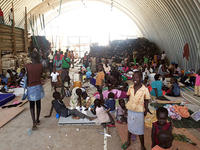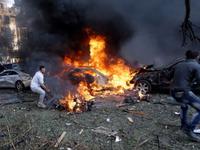-
Student cannot sue TSA, FBI agents over airport detention for Arabic flashcards
A student detained at Philadelphia International airport over his Arabic flashcards cannot sue the individual TSA and FBI agents who held him in custody, an appeals court has ruled. The student, double-majoring in physics and Middle Eastern studies, carried Arabic-English flashcards in his backpack. Most of the cards carried everyday words such as “nice”, “sad,” and “friendly.” Some of the cards, however, included words like “bomb,” “terrorist,” and “explosion.” Chief Judge Theodore McKee of the Third Circuit Court of Appeals in Philadelphia noted that the student clearly had the right to have the materials, but “it is simply not reasonable to require TSA officials to turn a blind eye to someone trying to board an airplane carrying Arabic-English flashcards with words such as ‘bomb,’ ‘to kill,’ etc.” He added: “Rather, basic common sense would allow those officials to take reasonable and minimally intrusive steps to inquire into the potential passenger’s motivations.”
-
-
Not all questions about the Tsarnaev brothers have been answered

What caused Tamerlan and Dzhokhar Tsarnaev to plant two bombs at the Boston Marathon finish line continues to puzzle investigators. Understanding the information which was available to local and federal law enforcement authorities before and after the attack might help prevent a future attack.
-
-
Global terrorism increasing, but fewer attacks in Western world
Terrorism touched eighty-five countries in 2012, but just three — Pakistan, Iraq, and Afghanistan — suffered more than half of 2012’s attacks (54 percent) and fatalities (58 percent), according to new data released the other day by the National Consortium for the Study of Terrorism and Responses to Terrorism (START) Global Terrorism Database (GTD). In addition to illustrating a continued shift in location of attacks, the new data — with more than 8,400 terrorist attacks killing more than 15,400 people in 2012 — also show an increase in attacks and fatalities over the past decade. Al-Qaeda central was not directly responsible for any attacks in 2012, but the six deadliest terrorist groups in the world were all affiliated to some extent with the organization. These include the Taliban, Boko Haram, al-Qaeda in the Arabian Peninsula, Tehrik-e Taliban Pakistan, al-Qaeda in Iraq, and al-Shabaab.
-
-
Deepening ethnic violence in South Sudan may ultimately tear the new country apart

Following last week’s announcement by President Salva Kiir of South Sudan that his government had foiled a coup attempt by his former vice president, Riek Machar, the country has been plunged into uncertainty. Escalating violence has already claimed hundreds of lives in the capital Juba. Thousands have fed the capital, seeking safety in remote rural areas of the country. Kiir belongs to the Dinka tribe which is the largest ethnic group in the country, with about 15 percent of the population. Machar is a Nuer, the second largest group with about 10 percent of the population. In the capital, Dinka-led South Sudanese forces have targeted members of the Nuer ethnic group, killing many and detaining others, including soldiers, lawmakers, and students. Outside the capital, in Jonglei State, Nuer militiamen have been targeting Dinka civilians and attacking oil fields.
-
-
Major bomb plot thwarted in Northern Ireland
Police on both sides of the Irish border have collaborated to foil a major bomb attack on a target in Belfast. Gardaí and the Police Service of Northern Ireland (PSNI) said the plot was linked to the arrest of two teenagers at a house just north of the border in south Armagh on Wednesday, where bomb making materials and equipment were found. Security sources note that the discovery comes after two separate dissident republican bomb attacks in Belfast’s commercial center since Friday. Security has been stepped up not only in Belfast but also along the border in the run up to Christmas as the PSNI and Garda are cooperating in an effort to thwart dissident republicans from carrying out a so-called terrorist “spectacular” during the festive period.
-
-
New terrorist faction threatening U.S. interests in the Sahel
The State Department on Wednesday warned that a new terrorist group linked to an Algerian militant is now posing “the greatest near-term threat to U.S. and Western interests” in the Sahel region of Africa. U.S. is concerned with Mokhtar Belmokhtar, an Algerian militant who has been conducting terrorist operations in the Sahel region for a while. The Sahel is vast, sparsely populated desert area on the southern reaches of Sahara desert, stretching from Senegal in the west to Chad in the east.
-
-
Two Guantanamo detainees sent to Algeria over their objections
The Defense Departmentannounced earlier this month that it had repatriated two Guantánamo Bay detainees to Algeria despite requests from both men to halt the transfers because of fear of persecution. The repatriations were announced a day after the Pentagon said that a Sudanese man would be repatriated to Sudan after serving a portion of his sentence as required by a pretrial agreement. Human rights advocates criticize the move based on humanitarian grounds, while conservative groups consider the transfer as a national security risk. Both detainees arrived at Guantanamo in 2002 – one was arrested in Pakistan, the other in Bosnia.
-
-
First French casualties in the Central African Republic highlight mission’s difficulties
Last week, less than a week after their arrival, two French soldiers were killed in the Central African Republic (CAR). The incident highlights the difficulty French troops face in an unstable country teetering on the brink of total chaos, and where international observers are worried about possible genocide, reminiscent of the Rwandan genocide in the 1990s.
-
-
Two U.K. terrorists plead guilty in U.S. court
Two British men who spent eight years fighting extradition to the United States have pled guilty to terrorism charges. Babar Ahmad, a 39-year-old south London resident admitted to charges of conspiracy and providing material support to terrorism. The case against both men is based on a Web site and terrorism support network that one of them operated in London. As one of the first Web sites promoting Jihadism in English, it played a pivotal role in spreading Jihadist propaganda as the movement began to develop in the West.
-
-
Hezbollah blames Israel, but assassinated leader had many enemies

Hassan al-Lakkis, the man considered to be Hezbollah’s tech expert, known for his expertise with drones, bombs, and other gadgets, was assassinated near his home last week. Al-Lakkis’s body was not yet cold when Hezbollah operatives began to blame Israel for the assassination, despite al-Lakkis’ long list of enemies. Hezbollah’s support of Syrian President Bashar al-Assad has gained it a long list of enemies, and many experts insist that the assassination of al-Lakkis does not resemble an Israeli-styled operation.
-
-
James Bond drank too much to perform at the level depicted in books, movies
A detailed examination of James Bond’s books shows that Bond’s weekly alcohol intake is over four times the recommended limit for an adult male, putting him at high risk of several alcohol related diseases, such as alcoholic liver disease, cirrhosis, impotence, and alcohol-induced tremor, and an early death. The medical team concluded that it would not be realistic to expect Bond to have the capacity to perform (in all aspects of life) at his high level of alcohol intake.
-
-
U.S. “bomb library” marks 10-year anniversary
It has been ten years since the FBI established the Terrorist Explosive Device Analytical Center (TEDAC), and since that time the multi-agency operation — sometimes referred to as America’s bomb library — has become an important tool in the nation’s fight against terrorism. Since its creation in 2003, TEDAC has examined more than 100,000 IEDs from around the world and currently receives submissions at the rate of 800 per month. Two million items have been processed for latent prints — half of them this year alone.
-
-
Africa’s Sahel region threatened by terrorism, organized crime: Ban Ki-moon
Terrorism, trafficking in arms, drugs, and people, and other transnational forms of organized crime are threatening security in Africa’s vast sub-Saharan Sahel region, Secretary-General Ban Ki-moon warned the Security Council yesterday. He called for continued strengthening of The UN Multidimensional Integrated Stabilization Mission in Mali (MINUSMA), a 12,600-strong force set up by the Council in April and authorized “to use all necessary means” to carry out security-related stabilization tasks, protect civilians, UN staff, and cultural artefacts in the cou8ntry, and create the conditions for provision of humanitarian aid.
-
-
Effectively modeling and profitably insuring terrorism risk
The insurance industry continues to explore ways to insure against terrorism risk, finding it a challenge despite developing various methodologies to measuring the likelihood of a terrorist attack. Terrorism experts in the insurance industry insist that because terrorism risk can be modeled, it can be effectively priced, and they note that several insurance companies are effectively modeling and profitably insuring terrorism risk today.
-
-
Texas terror case may hinge on reason for a FISA warrant
The Foreign Intelligence Surveillance Act (FISA), passed in 1978, was the center of a Fifth Circuit Court of Appeals trial last Thursday in New Orleans. The case involves Khalid Ali-M Aldawsari, a former Texas Tech student serving a life sentence for an attempted use of a weapon of mass destruction. At trial, federal prosecutors described Aldawsari as a “lone wolf” terrorist planning to wage a personal “holy war” from Lubbock, Texas. In the application for the warrants, however, prosecutors identified Aldawsari to a FISA court judge as an “agent of a foreign power.”
-
More headlines
The long view
How Male Grievance Fuels Radicalization and Extremist Violence
Social extremism is evolving in reach and form. While traditional racial supremacy ideologies remain, contemporary movements are now often fueled by something more personal and emotionally resonant: male grievance.
